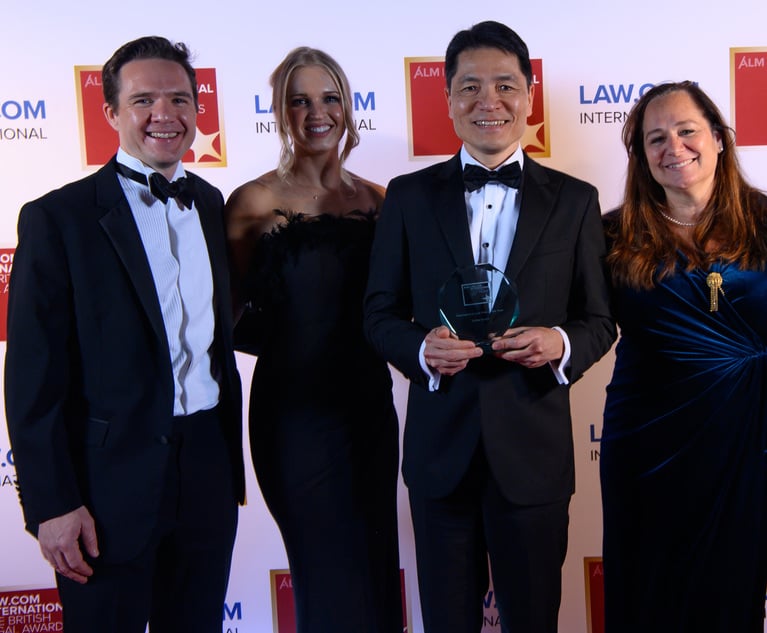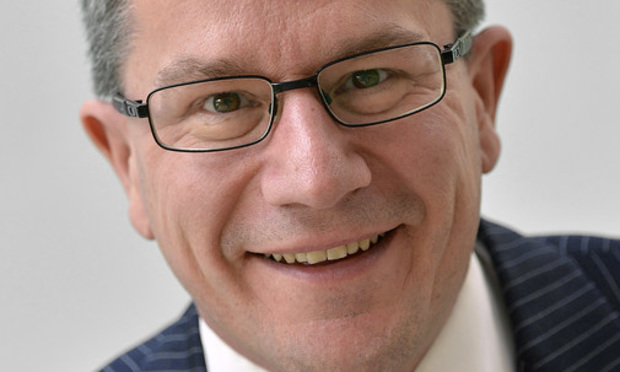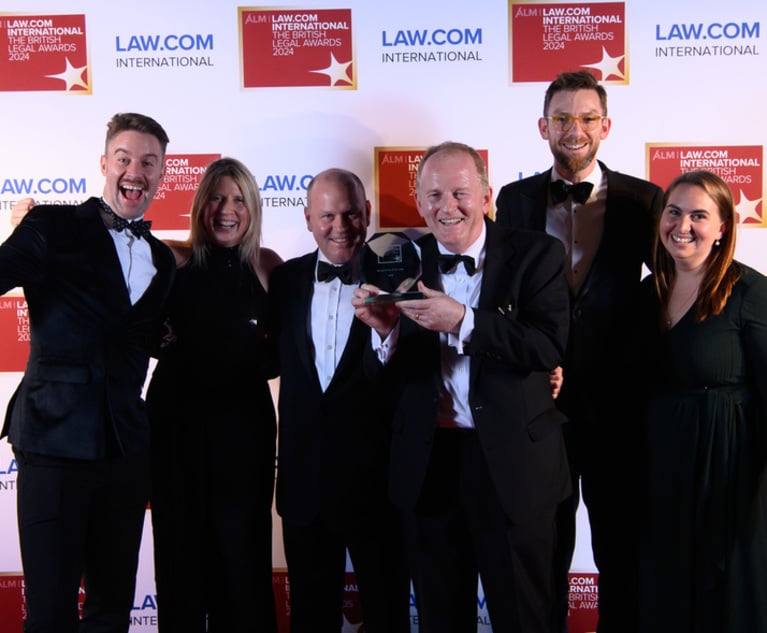BT tech and transformation GC Chris Fowler on improving law firm-client collaboration
BT's Chris Fowler will be among the speakers at LegalWeek CONNECT next month
October 31, 2018 at 08:48 AM
5 minute read
Chris Fowler is BT Group general counsel for technology and transformation, responsible for the legal support to the telecoms giant's tech arm. He will be speaking at this year's LegalWeek CONNECT conference, as part of a panel of senior in-house lawyers discussing collaboration and how alliances can benefit internal legal teams.
At LegalWeek CONNECT you're part of a panel discussion on legal departments and how they can drive better collaboration, both internally and externally – what are you expecting to touch on?
What I've envisaged is to talk about how we're trying to get our different providers to work together, as opposed to working individually. Also, we want to talk about how teams are using technology to encourage more collaboration, and how to facilitate these to get the best possible outcomes from our teams. And, more generally, we want to talk about why collaboration is important and what it really means.
What does collaboration mean to you personally?
It's about encouraging more interaction across boundaries within a business, and empowering people to do more, to integrate more, and to talk more, rather than just sticking to their individual jobs and not branching out beyond that.
Technology is a key focus for you – is this a particular area where there are opportunities for collaboration? Should law firms and their clients be working together to develop new tech solutions?
Sometimes law firms get a hard time when talking about technology. But it's noticeable to me that there are some law firms that are very much looking to embrace new technology and forefront innovation within their firms to give their clients the best service.
How can technology make collaboration easier?
We use Microsoft teams, (a platform that combines workplace chat, meetings, notes and attachments), which allows us to share information, share ideas and talk a lot more between teams.
It offers an alternative to formally writing someone an email. Instead, you can share things like pictures, gifs and emojis. It's fun to use and you don't have the issue of trying to get people to collaborate through more boring, traditional systems.
How important is the culture of a business when it comes to encouraging collaboration?
I would go so far to say it's the most important thing – it's massive. Unless you've got the right mindset and the culture within your company – of learning things by failing – you're never going to get to where you want to be. But that clashes with how lawyers are traditionally trained, which can create a few problems.
➤➤ Effective legal collaboration strategies and innovative partnerships will be explored on day one of LegalWeek CONNECT, taking place on 28-29 November at County Hall, London SE1. Click here for more information
How can in-house lawyers play a role in driving collaboration?
In-house functions can play a big part by being more transparent with the firms they work with about what they expect from them and explaining their overall strategy and vision to them. It needs to be more than just a discussion; it's also about having a good relationship between firms and organisations.
What is BT doing to encourage collaboration, both internally and with its external law firms?
Internally, BT is trying to bring teams closer together and encouraging people to do things in different practice groups, so that teams are moving around a bit and working within other teams.
With our external law firms, we're trying to drive a project where we don't just go to one firm. You shouldn't just assume that the best approach is by giving everything to just one firm. Instead, we want to break up the work and give it to lots of different firms for them to work together on a united project.
I've found that more and more firms are leaning more towards innovation, meaning the sense of collaboration is strong.
What are the the kind of roadblocks you've faced when trying to encourage better collaboration?
One roadblock we've seen is when people are fixated on the downsides and risks to certain projects. This attitude doesn't work when you're trying to create something new, but will get better if people commit more.
There's also a problem of people feeling nervous about losing control. There's a traditional view that keeping everything within one firm is the best way, because if you work with lots of firms then you're going to be using up all your time and energy trying to organise and collaborate them all.
But if all the studies say that bringing people together encourages the most creativity, why wouldn't the technique of bringing together more than one firm be valuable for a company?
What about LegalWeek CONNECT are you looking forward to?
The key thing that I think will be great at LegalWeek CONNECT is hearing about real case studies out there that demonstrate these practices working. An awful lot goes on in this area of work, but it's not until you actually come together and talk about it that we see these ideas truly come together and really flourish.
NOT FOR REPRINT
© 2025 ALM Global, LLC, All Rights Reserved. Request academic re-use from www.copyright.com. All other uses, submit a request to [email protected]. For more information visit Asset & Logo Licensing.
You Might Like
View All
International Law Firm of the Year: A Q&A with Sidley Austin's London Managing Partner
5 minute read
Inside Travers Smith's AI Training, Development Efforts

From Olympic Aspirations to Legal Innovation: Tom Dunlop's Journey to Founding Summize
8 minute readTrending Stories
- 1No Two Wildfires Alike: Lawyers Take Different Legal Strategies in California
- 2Poop-Themed Dog Toy OK as Parody, but Still Tarnished Jack Daniel’s Brand, Court Says
- 3Meet the New President of NY's Association of Trial Court Jurists
- 4Lawyers' Phones Are Ringing: What Should Employers Do If ICE Raids Their Business?
- 5Freshfields Hires Ex-SEC Corporate Finance Director in Silicon Valley
Who Got The Work
J. Brugh Lower of Gibbons has entered an appearance for industrial equipment supplier Devco Corporation in a pending trademark infringement lawsuit. The suit, accusing the defendant of selling knock-off Graco products, was filed Dec. 18 in New Jersey District Court by Rivkin Radler on behalf of Graco Inc. and Graco Minnesota. The case, assigned to U.S. District Judge Zahid N. Quraishi, is 3:24-cv-11294, Graco Inc. et al v. Devco Corporation.
Who Got The Work
Rebecca Maller-Stein and Kent A. Yalowitz of Arnold & Porter Kaye Scholer have entered their appearances for Hanaco Venture Capital and its executives, Lior Prosor and David Frankel, in a pending securities lawsuit. The action, filed on Dec. 24 in New York Southern District Court by Zell, Aron & Co. on behalf of Goldeneye Advisors, accuses the defendants of negligently and fraudulently managing the plaintiff's $1 million investment. The case, assigned to U.S. District Judge Vernon S. Broderick, is 1:24-cv-09918, Goldeneye Advisors, LLC v. Hanaco Venture Capital, Ltd. et al.
Who Got The Work
Attorneys from A&O Shearman has stepped in as defense counsel for Toronto-Dominion Bank and other defendants in a pending securities class action. The suit, filed Dec. 11 in New York Southern District Court by Bleichmar Fonti & Auld, accuses the defendants of concealing the bank's 'pervasive' deficiencies in regards to its compliance with the Bank Secrecy Act and the quality of its anti-money laundering controls. The case, assigned to U.S. District Judge Arun Subramanian, is 1:24-cv-09445, Gonzalez v. The Toronto-Dominion Bank et al.
Who Got The Work
Crown Castle International, a Pennsylvania company providing shared communications infrastructure, has turned to Luke D. Wolf of Gordon Rees Scully Mansukhani to fend off a pending breach-of-contract lawsuit. The court action, filed Nov. 25 in Michigan Eastern District Court by Hooper Hathaway PC on behalf of The Town Residences LLC, accuses Crown Castle of failing to transfer approximately $30,000 in utility payments from T-Mobile in breach of a roof-top lease and assignment agreement. The case, assigned to U.S. District Judge Susan K. Declercq, is 2:24-cv-13131, The Town Residences LLC v. T-Mobile US, Inc. et al.
Who Got The Work
Wilfred P. Coronato and Daniel M. Schwartz of McCarter & English have stepped in as defense counsel to Electrolux Home Products Inc. in a pending product liability lawsuit. The court action, filed Nov. 26 in New York Eastern District Court by Poulos Lopiccolo PC and Nagel Rice LLP on behalf of David Stern, alleges that the defendant's refrigerators’ drawers and shelving repeatedly break and fall apart within months after purchase. The case, assigned to U.S. District Judge Joan M. Azrack, is 2:24-cv-08204, Stern v. Electrolux Home Products, Inc.
Featured Firms
Law Offices of Gary Martin Hays & Associates, P.C.
(470) 294-1674
Law Offices of Mark E. Salomone
(857) 444-6468
Smith & Hassler
(713) 739-1250










